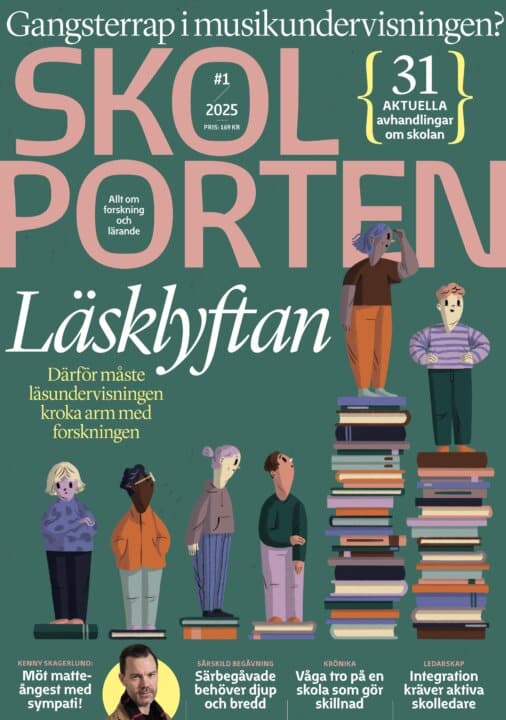Den romska minoriteten i majoritetssamhällets skola: Från hot till möjlighet
Romska barn och familjer diskrimineras fortfarande såväl i skolan som i övriga samhället. Erkännandet år 2000 av romer som en av Sveriges fem nationella minoriteter har dock enligt denna studie påverkat den romska minoritetens syn på skolan. Från att ofta ha betraktats som ett hot om att på olika sätt förlora sina barn, börjar skolan nu ses som en möjlighet av minoriteten.
Christina Rodell Olgaç
Professor Pirjo Lahdenperä
Docent Annika Rabo, Centrum för invandringsforskning, Sverige
LHS – Lärarhögskolan i Stockholm
2006-06-09
Den romska minoriteten i majoritetssamhällets skola: Från hot till möjlighet
The Roma as a minority in the mainstream schools: from a threat to a hope for the future.
Institutionen för samhälle, kultur och lärande (LHS)
Den romska minoriteten i majoritetssamhällets skola: Från hot till möjlighet
Den romska minoritetens relation till majoritetssamhällets skola. Från hot till möjlighet av Christina Rodell Olgaç är en studie utifrån ett interkulturellt perspektiv om den romska minoritetens skolsituation och majoritetssamhällets möte med minoriteten från mitten av 1900-talet och fram till idag. Avhandlingen bygger på texter av och intervjuer med romer och icke-romer samt deltagande observationer i en romsk utbildningsgrupp. Utvecklingen av begreppen kultur och etnicitet undersöks även och hur den kan ha påverkat synen på romer i forskning. Här beskrivs också en interkulturell forskningsprocess.
Fortfarande diskrimineras romska barn och familjer såväl i skolan som i samhället. Erkännandet av romer som en av Sveriges fem nationella minoriteter år 2000 har dock enligt studien påverkat den romska minoritetens syn på skolan. Från att den ofta har betraktats som ett hot att på olika sätt förlora sina barn, börjar nu skolan ses som en möjlighet av minoriteten. Gensvaret från majoritetssamhället är dock svagt och kunskapen om den romska minoriteten är begränsad. Studien framhåller betydelsen av ett interkulturellt förhållningssätt till bilden av Sverige, så att också de nationella minoriteternas perspektiv kan bli en del av denna bild. Ett sådant förhållningssätt kan också utgöra majoritetssamhällets möjlighet att närma sig minoriteten och öka sin kunskap och självkännedom.
The Roma as a minority in the mainstream schools: from a threat to a hope for the future.
The purpose of this study is to investigate, describe and analyse how the relationship between the Romani minority and the Swedish majority has developed from the middle of the 20th century until the present time with regard to the school situation for the Roma. In order to discuss the changes in the relationship between the majority and the Romani minority, it has been important to analyse the concepts of culture and ethnicity, how these concepts have been used to define the Roma, and how, in turn, this definition has influenced how the Roma have been portrayed in the literature.
The study is based on three types of data: texts, interviews and observations, that have been organised to cover three different periods. Three autobiographies and two theses cover the first period, from the middle of the 20th century to the 1970s, when the Roma were allowed into schools. The interviews cover the second period, from the 1970s to the year 2000, when the Roma were recognized as a national minority. The participant observations and the interviews cover the third period that deals with the present and the future with regards to education of the Roma.
An interpretive hermeneutic approach has been used to analyse the data. The analysis takes the school as one order of discourse in which different discourses attempt to dominate. Both ethnicity and culture are discussed in relation to power relationship between the Roma and majority society. A chain of consequences approach has been used to analyse the situation of the Roma in schools, where one event in the chain results in certain consequences, for example the Romani child is present in school but without support from school or home. The consequence is school failure and marginalisation.
One of the main themes that emerge from this analysis, is how schools gradually transferred the responsibility for educating the Romani children to the families, thus abdicating their role as providers of academic development. The other theme is how the school took a deficit perspective in relation to the Romani families and, rather than taking responsibility for the education of the Romani children, they blamed the failures on the Romani group and its culture. The study concludes that the institutional discrimination of the Roma and the total exclusion of the Romani culture in school still has far reaching consequences. One of consequences is that, in order to be accepted in school, some of the Romani children begin to undercommunicate their ethnic identity. Since the recognition of the Roma as a national minority, there has been a remobilisation and revitalisation by the group and their demand for more inclusion in education. This thesis suggests an intercultural approach as an alternative i.e., a change of perspective and a revision of the image of Sweden as a monocultural and monolingual nation.
Relaterade länkar

Yrkesutbildning för vuxna
 Vux
Vux
När leken inte fungerar
 Fsk
Fsk








